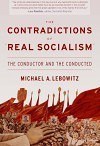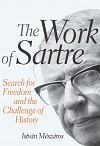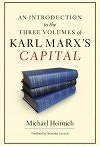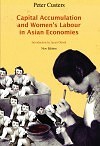Marxism
“We are sinking in the Devil’s excrement,” wrote a close observer of Venezuela’s adventures in oil. Was Venezuela’s deep culture of corruption, crime, and clientalism imaginable in the absence of the oil rents which became the supreme object of desire? Was the truncation of industry and agriculture and the vast chasm between a privileged oligarchy and an impoverished mass inevitable-given the effects of oil wealth upon a poor, developing country? | more…

In this concise volume, noted scholar and economist Michael A. Lebowitz considers the legacy of twentieth century socialist societies, or what some have termed “real socialism.” While these societies were able to claim major achievements in areas from health care to education to popular culture, they nonetheless met limited success in eroding what Marx called the “opposition of the worker as direct producer and the proprietor of the means of production.” That this opposition between workers and managers continued to exist in one form or another under “real socialism” means that, according to Lebowitz, a crucial aspect of the socialist project was lost. | more…
Bill Livant was an independent Marxist intellectual whose main purpose was to provide theoretical tools to people engaged in revolutionary struggles. The Red Scare after the Second World War did not diminish the admiration he had felt for the Soviet Union during the war. The subsequent execution of Julius and Ethel Rosenberg was an ideological turning point for him. While working on his PhD in psychology at the University of Michigan, Bill stood out as a prominent radical. He was part of the Students for a Democratic Society movement that produced the Port Huron Statement | more…

This landmark book, first published in 1979, met acclaim as a doubly important work of radical philosophy. Its subject, Jean-Paul Sartre, was among the twentieth century’s most controversial and influential philosophers; its author, István Mészáros, was himself establishing a reputation for profound contributions to the Marxian tradition, which would continue into the next century. In this completely updated and expanded volume, Mészáros examines the manifold aspects of Sartre’s legacy—as novelist, playwright, philosopher, and political actor—and in so doing casts light upon the entire oeuvre, situating it within the historical and social context of Sartre’s time. | more…

Heinrich’s modern interpretation of Capital is now available to English-speaking readers for the first time. It has gone through nine editions in Germany, is the standard work for Marxist study groups, and is used widely in German universities. The author systematically covers all three volumes of Capital and explains all the basic aspects of Marx’s critique of capitalism in a way that is clear and concise. | more…
Paul M. Sweezy was, in the words of his contemporary John Kenneth Galbraith, “the most distinguished of present-day American Marxists.” A Harvard-trained economist, his writings spanned some seven decades from the early 1930s to the closing years of the twentieth century. For more than half a century he was coeditor of Monthly Review, subtitled An Independent Socialist Magazine, which he founded along with Leo Huberman in 1949. Although first and foremost an economist, Sweezy was also a social scientist in a much broader sense. His impact on political science, sociology, history, and other disciplines was profound. He took the entire globe as his field of analysis, helping to enlarge our understanding of imperialism and of the necessity of revolution, particularly in the third world. | more…

The global impact of Asian production of the wage goods consumed in North America and Europe is only now being recognized, and is far from being understood. Asian women, most only recently urbanized and in the waged work force, are at the center of a process of intensive labor for minimal wages that has upended the entire global economy. First published in 1997, this prescient study is the best available summary of this crucial process as it took hold at the very end of the twentieth century. This new edition brings the discussion up to 2011 with an extensive introduction by world-famous economist Jayati Ghosh of Delhi’s Jawaharlal Nehru University. | more…
The collapse by century’s end of most of the post-revolutionary social experiments of the twentieth century put socialists nearly everywhere on the defensive. Today’s call for a “socialism for the twenty-first century” is an attempt to transcend this defensive posture and to engage fully with the most urgent problem of our time: the creation of a sustainable socialist order. In this respect, “István Mészáros,” in the words of President Hugo Chávez of Venezuela, “is someone who lights up the road. He points to the core of the argument we must make in order to go beyond the defensive attitude in which the world’s peoples and revolutionary movements find themselves, and to take the offensive, throughout the world, in moving toward socialism” (quoted from back cover of Mészáros, O desafio e o fardo do tempo histórico [Sáo Paulo: Boitempo Editorial, 2007]; English edition, The Challenge and Burden of Historical Time [forthcoming from Monthly Review Press, 2008]). | more…
The victory of the No vote in the Venezuelan constitutional reform referendum in December is being treated by Washington as a major defeat for Chávez’s efforts to promote a socialism for the twenty-first century in Venezuela. But the opposition to the Bolivarian Revolution was so aware of its own weaknesses that it adopted as its final slogan “Chávez, Yes; Reform, No.” The defeat of the constitutional reform was guaranteed by the fact that 44 percent of the population, many of whom had supported Chávez previously, chose not to vote. This may simply be due to the fact that the proposed constitutional reforms were enormously complex with changes in 69 articles. But it is also true that a propaganda campaign authored and choreographed by Washington and the CIA, and implemented by the Venezuelan elites who control the private media, had a considerable effect in blocking the reform effort. | more…
I am here to salute you—because you are attempting to do what nobody has ever succeeded in doing before—help autonomous groups of workers and consumers plan their interrelated activities democratically, equitably, and efficiently themselves. You have already created the elements of what you call the “social economy”—worker-owned cooperatives, communal councils, municipal assemblies, participatory budgeting, subsidized food stores, health care clinics, and nuclei of endogenous development. Now you want the cooperatives and communal councils to display solidarity for one another rather than treat each other as antagonists in commercial exchanges. And sooner rather than later you want the benefits of this kind of participatory, socialist economy to encompass the entire economy and all Venezuelans. | more…
This year marks the 150th anniversary of the birth of Thorstein Veblen, the greatest critic of U.S. capitalism in the early twentieth century and one of the foremost social theorists of all times. Veblen was the subject of a special issue of Monthly Review fifty years ago last July in celebration of the centennial of his birth. He remains important today from our perspective for at least three reasons: (1) he was the first to develop a theory of monopoly capitalism, including a recognition not only of the implications of the rise of a big-business dominated economy, but also the new role assumed in this era by finance, advertising, the penetration of the sales effort into the production process, excess productive capacity, etc.; (2) Veblen provided a strong critique of the ecological destruction of U.S. capitalism (particularly the devastation of forests); and (3) Veblen’s unbridled wit and sardonic language coupled with his keen analysis cut to the heart of capitalist ideology. Thus, for instance, he wrote of the ahistorical character given by orthodox economics to such categories as capital and wage labor | more…
In “The Imperative of an International Guaranteed Income” (Monthly Review, April 2007) Stephen Fortunato Jr. presents a pretty good outline of guaranteed annual income (GAI) issues and how they might apply on an international scale. As a Marxist, I take the view that a GAI won’t work | more…



